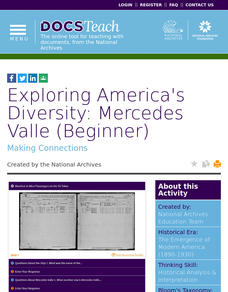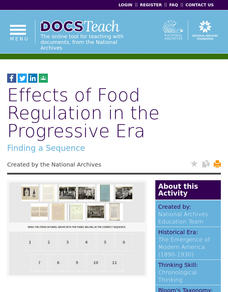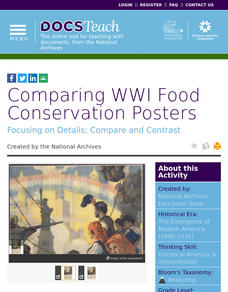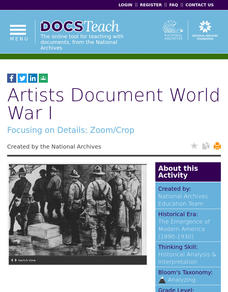Smithsonian Institution
Separate is Not Equal: Fight for Desegregation
Separate is not equal! An eye-opening lesson delves into the past to understand the fight for desegregation and how it impacted African American communities. Academics complete two one-hour lessons using documents, photographs, and...
Smithsonian Institution
Borders within the United States: Indian Boarding Schools and Assimilation
Native American Nations ... sovereign entities or removable tribes? A thought-provoking instructional activity explores the relationship between Native American tribes and the United States, including forced assimilation and removal from...
Smithsonian Institution
Borders with the World: Mexican-American War and U.S. Southern Borderlands
The Mexican-American War created social borders—not just physical ones. Scholars learn about the effects of the Mexican-American War on the people living in the borderlands using text excerpts, maps, and partnered activities. Academics...
DocsTeach
Inevitable Accident or Wrongful Act: Judging the Titanic Disaster
The unsinkable ship that sunk. Scholars review the case against the White Star Line following the tragic loss of life from the Titanic disaster. Academics read documents and organize them into arguments for and against the cruise line....
DocsTeach
Exploring America's Diversity: Rosalia Fundaro (Beginner)
Elementary scholars learn about the life of Rosalia Fundaro, an Italian immigrant, using primary sources. They analyze documents, complete written prompts, and participate in group discussion to understand Rosalia's life in the United...
DocsTeach
Exploring America's Diversity: Motel Garber (Beginner)
Young detectives delve into the past in an exciting series exploring immigration. The activity uses primary sources to teach elementary scholars historical analysis. Academics read records to understand the life of Motel Garber, from...
DocsTeach
Exploring America's Diversity: Mercedes Valle (Beginner)
An enlightening activity focuses on the life of Mercedes Valle, an immigrant from Ecuador. Scholars analyze ships and census records to understand the life of Mercedes Valle. In addition, they participate in a group discussion and...
DocsTeach
Exploring America's Diversity: Luther Powell (Beginner)
Luther Powell immigrated to the United States to live the American dream—and create a better life for his son, four-star general Colin Powell. Elementary academics look at documents, such as, ship records to understand the immigration...
DocsTeach
Environmental Case Study: Hetch Hetchy Valley
What is more important: building a new school or preserving a nature reserve? Keeping a natural area clean or providing clean drinking water to a city of millions? Young scholars weigh these questions—almost literally—using an...
DocsTeach
Effects of Food Regulation in the Progressive Era
Moldy canned goods, exploding ketchup, and filthy conditions: These were some of the issues the reformers of the Progressive Era targeted with legislation such as the Pure Food and Drug Act. Using images of food factories and documents...
DocsTeach
Comparing WWI Food Conservation Posters
Food will win the war! At least, that is what some World War I-era posters say. Using two propaganda posters—one in English and one in Yiddish—young scholars consider why the Wilson administration had the posters created. Discussion...
DocsTeach
Comparing Urban and Rural Life in the Early 1900s
Experience a bit of what life was like at the turn of last century with images of rural and urban life. Learners consider pictures from each environment and then compare and contrast them. Activities include discussing the differences,...
DocsTeach
Chinese Exclusion Broadside Analysis
Racism against Asian American goes deep in American history. Using a broadside in favor of the Chinese Exclusion Act, class members examine clues—with key portions of the document blacked out—to better understand the roots of anti-Asian...
DocsTeach
Before and After Carlisle School
White reformers thought they were "killing the Indian" to "save the man." Native children were taken from their parents and placed at boarding schools, such as the Carlisle School. Using a comparative photo analysis of children before...
DocsTeach
Baseball on the World War I Homefront
Are sports essential to American life? Young historians ponder the question as they examine letters between the owner of the Boston Red Sox and Navy Secretary Franklin D. Roosevelt during World War I. The owner wanted two star players...
DocsTeach
Assimilation of American Indians
Imagine being forced to give up your culture and then being graded on how well you complied with orders to do so. Documents show young historians the price indigenous peoples paid as a result of the Dawes Act, which was essentially a...
DocsTeach
Assimilation and the Native People of Metlakahtla, Alaska
Fitting in to a dominant culture comes at a price—especially for native peoples. Class members consider this concept using a photo matching game of indigenous people in Alaska. Discussion questions help them consider to what extent these...
DocsTeach
Artists Document World War I
Drawings may be worth even more than a thousand words. Curious scholars query an artist's rendering of troops leaving a ship after they have arrived in Europe to fight in World War I. By zooming in and looking at the entire piece, class...
DocsTeach
Analyzing Photographs of the Triangle Shirtwaist Factory Fire
While a catalyst for the labor movement, 146 people lost their lives in the Triangle Shirtwaist Factory Fire in 1913. A series of photographs of the aftermath of the tragedy help young historians consider the impact of the fire. The...
DocsTeach
Analyzing a Child Labor Photograph
Sometimes images tell shocking stories. Individuals examine a Lewis Hines picture of children packing beans and consider the impact working in a factory had on their young lives. A series of prompts emailed to the teacher helps them...
DocsTeach
President Reagan and the Cold War: Vision and Diplomacy
After years of boiling tension, the presidency of Ronald Regan and the rise of Mikhail Gorbechev paved a new way forward for diplomacy between the United States and the Soviet Union. Using primary source documents, including letters...
DocsTeach
Landing a Man on the Moon: President Nixon and the Apollo Program
Take the small step for man and giant leap for mankind with the Apollo astronauts using primary sources. Young historians explore the documents related to the American space program up through the lunar landing, including presidential...
DocsTeach
Exploring America's Diversity: Miguel Miñan (Beginner)
Many have traveled from around the globe searching for the American dream. Scholars research the life Miguel Miñan, an immigrant from Brazil, using ship and census records. The activity focuses on American diversity and highlights the...
DocsTeach
Exploring America's Diversity: Gertrud Danneberg (Beginner)
Everyone is an immigrant in their own way. Young scholars read historic documents to understand one woman's journey from Germany to the United States. The activity uses a mixture of text, discussion, and written prompts to help...

























